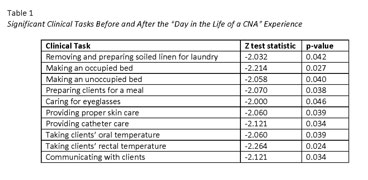
The Certified Nurse Aide (CNA) program offered at the Simulation, Teaching, and Academic Research (STAR) Center at West Penn Allegheny Health System (WPAHS) in Pittsburgh, Pennsylvania is a State Department of Education program that provides students with the education needed to serve as CNAs. The design of this program is meant to encourage educational and future career success for CNAs.
Students learn clinical theory and skills in a 124.5-hour program through didactic teaching (40 hours), simulation lab (29.5 hours), and clinical experiences (55 hours). The curriculum is mandated by the State Department of Education, but the STAR Center has incorporated additional elements into the schedule to make the program more holistic. The STAR Center provides students with a study skills session, “A Day in the Life of a CNA” simulated experience, review sessions, an interviewing training session, and personalized feedback on their mock testing day as additional components in the curriculum. The STAR Center also provides students with personal support through advisors and a social worker.
The first unique component of this program is a study skills session. During this session, students take the online “Learning Style Inventory,” that categorizes students into one of three learner types: auditory, visual, or tactile. The students then receive instruction on study methods that meet each of these three individual learning styles. Students are also given a study skills and test taking strategies booklet that contains tips on how to study and take tests efficiently. Additional instruction on time management, how to manage schoolwork with children and organizational skills is also provided. This session provides students with lifelong skills that are applicable to many areas beyond school.
As an extra part of their career preparation, students spend “A Day in the Life of a CNA,” which is a simulated experience where students act out the CNA roles, by responding to simulated patients’ call lights, performing clinical skills, and completing patients’ charts. This activity is designed to give students the experience they need to feel more comfortable by performing clinical tasks in a risk-free environment. To gauge its effectiveness, students complete pre- and post-surveys before and after the training session on which they rate their comfort levels in performing 31 clinical tasks on scales from one (“Very Uncomfortable”) to seven (“Very Comfortable”). In the first class of nine students, ten of the 31 skills (32%) that students rated their comfort levels on significantly changed from before they participated in this training session to after, indicating that they felt more comfortable after the training. (See Table 1)

The CNA training program’s format is designed to aid students remember important concepts by holding many small review sessions. At the end of each day, material is reviewed and tips are provided on what to study that night. Similarly, at the start of each class, material from the previous day is reviewed and any questions that the students may have are answered. Material is also reviewed before and after each test.
The STAR Center’s program is not only focused on the success of the students’ current education but also on the success of their futures and so an Interviewing Skills session is held during the program to help students prepare for job interviews. During this session, students heard from a Human Resources employee, a School of Nursing representative, watched a 10-minute video that showed a job interview, received the CarePix model that WPAHS uses and a 10-page job preparations booklet, which contained information on resumes, cover letters, interviews, and thank you letters. Students evaluate the effectiveness of each learning component on a scale from one (“Very Ineffective”) to seven (“Very Effective”). The first class of nine students rated the School of Nursing guest speaker the highest, with a mean of 6.33. Overall, the students felt this session was fairly effective with a mean of 5.67.
The final element of the STAR CNA training program’s curriculum that sets this program apart is the design of the mock testing day. Although the state of Pennsylvania requires a mock testing day, the STAR Center goes beyond this requirement and video-tapes students’ performances and provides them with personalized feedback.
Students are also supplied with human support via personal advisors and a free-of-charge social worker. Students are matched with a STAR staff member to serve as their personal advisor to answer any questions that they may have and to guide them through the program. Students also have the opportunity to meet with the social worker, for mentoring and/or tutoring services.
The STAR Center provides Certified Nurse Aide students with the highest quality education. The staff is dedicated to seeing the success of the students and work hard to ensure that their program empowers the students with the knowledge needed to succeed on the PA state certification exam. Other CNA training programs can emulate the design of this program’s format to ensure the educational success and overall well-bring of the students.
Laura Daniel, Ph.D., is a psychometrician / statistical research analyst for the STAR Center. Jordan Wilfong, MSW, LSW is a social worker at Family Behavioral Resources. Marianne Pisano, RN, BSN, NHA is the administrator at Highland Park Care Center.



